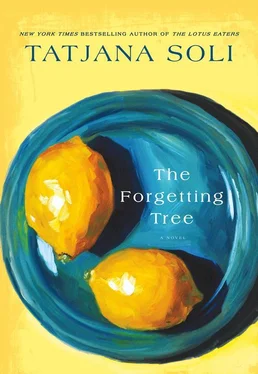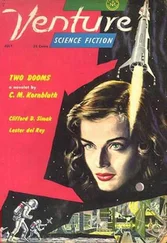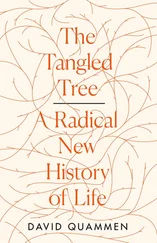She thought of home, lòt bò dlo, going to the other side of the water, for the first time in a long while. She could bear the current pain because she knew she was about to return to the small house by the ocean where she was raised, loved in Maman ’s arms. The sun made the tin roof a burning semaphore at noon. As unlike the room she breathed in that moment as two rooms could be. Burning and hot and blinding. Her maman —had she ever been so young? Prettier even than the Minna in the mirror. She felt a stab of happiness that had not been hers since early childhood.
Maman used to say when someone died that they were returning by the slow road lan Guinée, to Guinea. She told of her grandparents in Africa having been made to circle the forgetting trees so that they wouldn’t pine away to go home. That’s what the slaves said, and what was Marie if not a slave in every sense that counted?
A dream of her own death released Marie. Finally she would meet Maman ’s younger, inviolate self on that road, and they would move on to a freedom never granted in this life.
In the dream, Josie and Thibant, and even Jean-Alexi, appeared, and Marie forgave them all because they had the excuse of poverty.
Empty stomach trumped all.
* * *
No one would mourn Marie, either. Just as it had been for Maman . Linda would call one of the services that drove white trucks to the house and carted away all that was broken, offensive, unsightly. Those things disappeared from the neighborhood as if they never existed, to keep the illusion of perfection: a mildewed carpet disappeared this way; a drunken, violent husband carted off; a baby alligator coiled under a hibiscus bush disposed of in a metal box. It would be as if Marie had never lived in that house, her presence scrubbed away as diligently by the next girl as she had scrubbed away the dirt left by the unknown one before her, the one who had saved Linda’s life from overdose. A long succession of disposable beings. Perhaps Linda would tell James that Marie was troubled (although he understood Marie was only hungry). Perhaps Linda would hear things from Coca, or she might mix up Marie’s story with the pasts of her other cleaning girls, or more likely, she would simply forget, uninterested. The memory of Marie landing neatly in the detritus of Linda’s past.
None of this bothered Marie; it was just a story that happened to someone else. She had sunk easily into the sea of black faces in Florida, all of them uprooted, blowing like weeds, some coming to rest in cracks where they grabbed hold — grabbed hold for life but never wanted, easily pulled loose again. Or rather wanted only to clean houses but not sit across the table to break bread. To nurse but not be cared for. To fuck but never, never, be loved.
She felt a violent downward twisting of the earth. Her stomach turned on itself, devouring. All the contents of the morning — breakfast, pills — came up and created a purplish death-stain on the rug. Her thoughts pumped as slowly as her blood, and there was another deep drag in her intestines. She cursed herself that she worried about the stain on the carpet. Clear that this would take too long. The end. She grew ravenous for it.
The gun, cold and heavy as a stone, welcoming, hidden away in the drawer by Linda’s bed. Before, she had not considered anything so big and violent, but now she was eager to leave this agony. As long as she didn’t disfigure her face. A bullet to the heart would be fine. Her legs were rubber as she staggered back to the bedroom, the floor like a moving ship, and she pulled hard on the drawer so that it flew off its tracks, contents sprawled across the floor. She shoved papers aside, impatient, but the gun was gone. She broke into tears as a manila envelope taped to the underside of the drawer swam into her view. Angry, she ripped it off, tearing the envelope, thoughts pumping slowly, her head packed in cotton. Green bills fluttered down into her lap. Hundred-dollar bills. Many, many hundred-dollar bills.
She crawled to the other side of the bed and pulled out those drawers, found another envelope, more fistfuls of money. Now she staggered to the toilet and gagged herself to vomit the rest of the contents in her stomach. In the kitchen, she drank glass after glass of water. Could luck in one’s life appear in such sordid ways? Salvation by such dark means? She kicked off the high heels, hiked up the long dress, and moved like a madwoman, yanking drawers out, sending the insides flying — pajamas, panties, bras, socks, shirts, scarves. No other envelopes to be found, but the two were enough.
She took an empty purse from Linda’s shelves and stuffed the money inside. She took nothing else than the dress and the gold sandals, strapping them back on and wobbling through the living room. On a whim, she grabbed the signed book out of its glassed prison. The book was hers, belonged to her through shared pain, and no one like Linda deserved to own it. Some things belong to one because life had earned it off one in blood and sweat. Marie made her way out the front door, careful to lock it behind her. She walked outside — a black woman in an evening dress in broad daylight. If a policeman stopped her, she would have confessed and turned herself in. She had nothing left to fight with. She would have accepted being sent back home or to prison. She would have let them kill her as they had Maman . Perhaps their line was simply not made up of survivors.
Not a single person spoke to her. As usual. She walked on as if invisible, for over an hour, till she reached the bus station. Her feet ached. She asked for a ticket and pulled out a crisp hundred-dollar bill. The woman behind the glass was overweight, with damp skin and glasses that kept sliding down her face. Marie guessed from her eyes that she also went home to an empty room. The woman nodded as if she were about to fall asleep.
“Can’t break a hundred, unless your fare is close to that amount.”
“Where will this much money take me?”
The woman blinked behind thick lenses that magnified her drooping eyes as she studied the timetables. In that affluent area, the people who went out by bus always had unhappy reasons for escape. “Where you headed? North? Not much South left from here. Key West. Not much East either, matter of fact.” She said this in a jokey way that Marie could tell had been repeated thousands of times before so that it had lost its meaning.
No other explanation for the woman’s lack of surprise except that each day she was confronted with people who had no requirement to be in any one place — no pull of family or job or particular inclination — but instead chose place as a substitute for freedom, for meaning, for love.
“Someplace warm,” Marie said. “Like this but as far away from here as possible.”
The woman sighed, considering the proposition. “Two of those bills will get you to California, how about that?”
Minna didn’t believe in the past, it was just a story that happened to someone else, to a girl named Marie, whose mother lost her face in the iron forest, but when she first saw Claire’s farm, she thought it was the most beautiful place in this world. She did not want to take off her sunglasses because tears of homecoming were in her eyes. Far as the eye could see there were oranges and more oranges, and she remembered Maman ’s prophecy now come true — they would be returned to the time of sweetness.
She was the Antoinette of the novel; the book, too, become prophecy. Antoinette goes to the convent. My refuge, a place of sunshine and of death … Marie had traveled to a foreign land only to be returned to the original Garden, her own place of sunshine and of death. Only words stood between her and the coming sweetness. Words that she had learned to use like a knife.
Читать дальше












